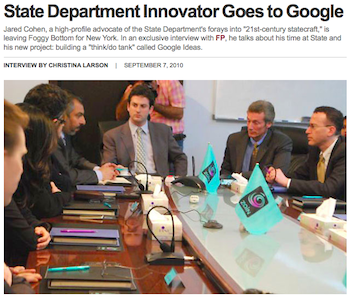On Wednesday night, over 200 movers and shakers from the fields of finance, law, and policy crowded into a meeting room at the Council on Foreign Relations in New York to hear a talk by Google CEO Eric Schmidt and the new “director of Google Ideas” (and Council fellow), Jared Cohen. The event was part of the Council’s ongoing CEO Speakers series, which has brought a steady stream of corporate moguls through the doors of the organization’s elegant Park Avenue headquarters.
This, however, was a mogul evening with a difference. Schmidt and Cohen based their talk on their co-authored article, The Digital Disruption, in the current issue of Foreign Affairs, the Council’s flagship publication.
In both the article and the talk, Schmidt and Cohen made a strong and irrefutable argument that digital media is altering world affairs.
“I’m extraordinarily excited about the scale of the mobile revolution,” Schmidt said. “… There are four to five billion mobile phones of one kind or another and we are approaching a billion smart phones.”
Schmidt added that the effect of Moore’s Law will be to transform smart phones into the world’s dominant communications platform in the near future.
The implications of the mobile revolution, he said, “are just beginning to be understood. But remember that these devices are more powerful than supercomputers were a few years ago, and we are putting them in the hands of people who’ve never had anything like it before.”
But Schmidt’s conclusion about the cultural impact of this revolution was more tentative.
“We’ll run a test and discover if everyone else is as obsessed with Britney Spears as Americans are … and the answer is probably yes,” he said.
Digital Media Cut Both Ways
Schmidt acknowledged that digital media have had negative as well as positive effects in the U.S. Some American journalists cite Google News’ role as an aggregator of free news content as a factor in the collapse of their profession’s business model. Schmidt agreed that the new media environment has its downside. “More speech doesn’t necessarily mean better speech,” he admitted. The new order “is not necessarily producing a better democracy — just a louder one.”
At several points, Schmidt referred to the engineering mindset that has defined Google culture. These engineers have suddenly (and often unintentionally) found themselves at the center stage of world diplomacy. Google has been under considerable pressure to reconcile its business practices in politically restrictive markets such as China with the complexities of freedom of expression concerns.
In 2005, in the video embedded below, Google co-founder Sergey Brin told a class of Berkeley students, “Technology is an inherent democratizer.”
But Schmidt’s remarks at the Council suggested that things aren’t quite that simple. “Technology is neutral,” he said.
There is great potential for digital media to advance the cause of government transparency and human rights; but at the same time, he noted considerable potential for harm. Online media empower the individual in unprecedented ways, he said.
“The nature of the technology is to unite the citizens, but it can unite them in favor of a repressive government,” he said. His worst fear, he added, was digital media’s possible “empowerment of the rogue evil person.”
Contrasting Impact of Digital Media
It appears that Google’s leadership realize that they need greater breadth in addressing foreign policy concerns. Clearly, the hiring of Jared Cohen
is a cornerstone of their strategy. Cohen was brought into the Bush Administration’s State Department as a 24 year-old wunderkind to work on international media policy issues, and he made an easy transition to Hillary Clinton’s team. Cohen represents the timely addition of a “wonk” to Google’s “geek” culture, a bridge between the Washington policy and West Coast tech communities. He is unusual in both circles due to his extensive grassroots experience.
At the Council, he gave a first-hand description of digital media’s benefits during Iran’s “Twitter revolution,” but contrasted it with meeting a “Guatemalan family extorted by cellphone from an MS 13 gang member in prison in Los Angeles.” (Cohen’s 2008 appearance on the Colbert Report provides a good introduction to his approach.)
Cohen’s August appointment to the directorship of Google Ideas signaled Google’s intent to craft a more nuanced form of corporate foreign policy that could evolve in closer consultation with foreign policy circles in Washington and New York. At the same time, his fellowship at the Council on Foreign Relations indicates that CFR may be ready to take the digital revolution more seriously. (It was telling that the Council told members such as myself that they were allowed to liveblog the meeting, while at the same time preventing us from using electronic devices into the meeting room itself.)
The Council, like the State Department, has been reenergizing its online presence and can now point to activity on Facebook and Twitter. But while America’s foreign policy community and tech community may share values and goals, there’s a ways to go before the wonks and the geeks speak the same language. In the meantime, digital media is disrupting the world faster than either can measure.
Anne Nelson is an educator, consultant and author in the field of international media strategy. She created and teaches New Media and Development Communications at Columbia’s School of International and Public Affairs (SIPA) and teaches an international teleconference course at Bard College. She is a senior consultant on media, education and philanthropy for Anthony Knerr & Associates. She is on Twitter as @anelsona, was a 2005 Guggenheim Fellow, and is a member of the Council on Foreign Relations.

